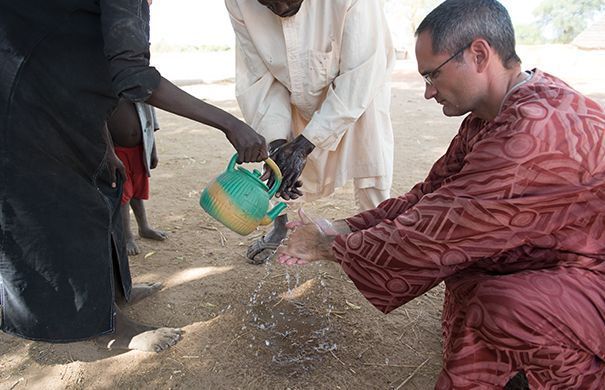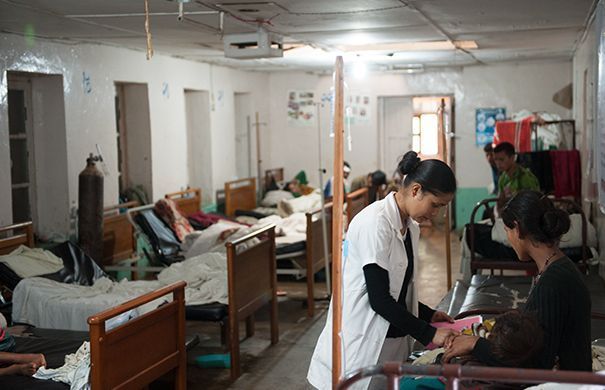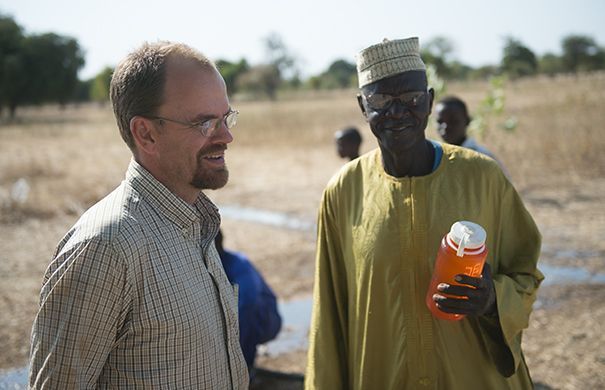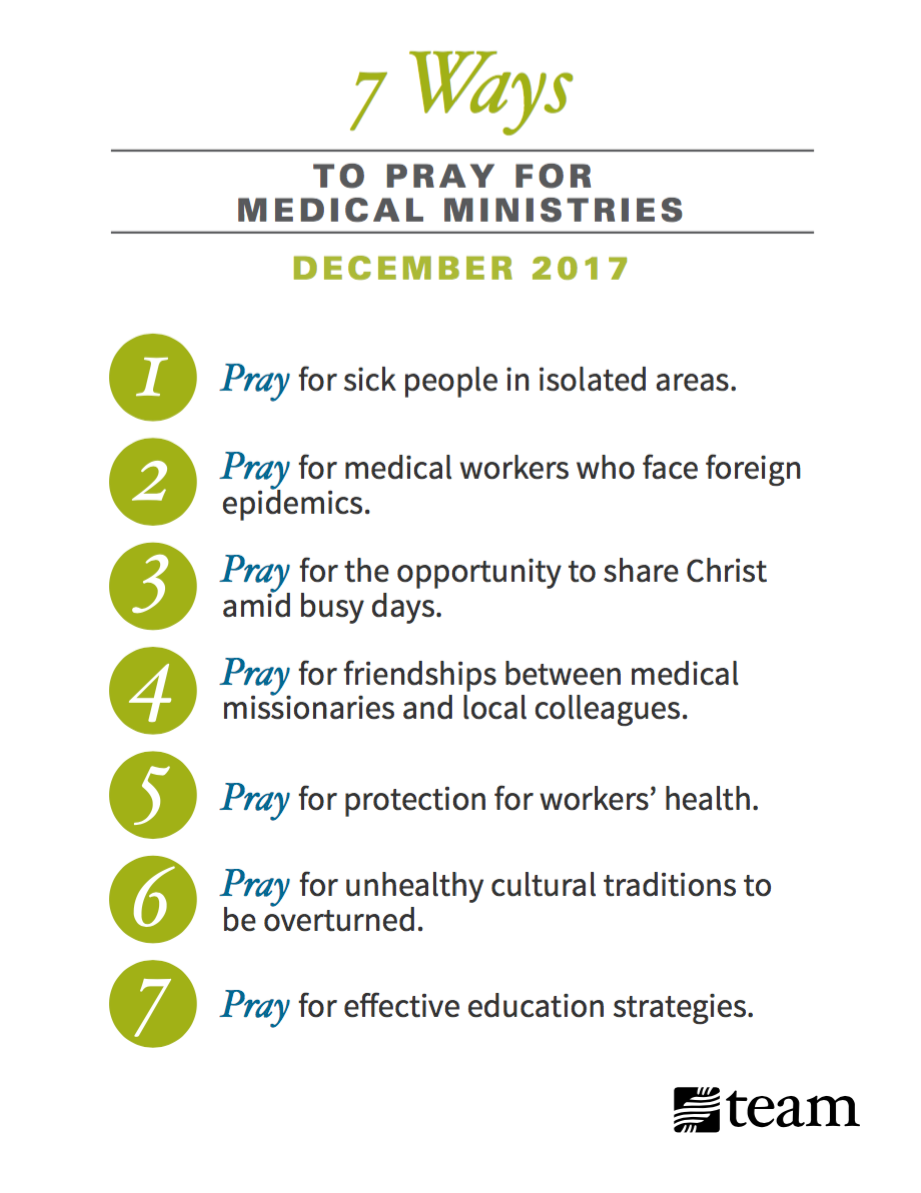There’s an old saying that “people don’t care what you know until they know that you care.” If anyone understands that, it’s Jesus. During His ministry on Earth, He often healed people’s physical ailments before tending to their spiritual needs.
Being the hands and feet of Christ means that we are called to bring hope and healing. For this reason, medicfal missionaries go into the most remote, and often most diseased, parts of the globe.
This December, will you pray with us for medicine and healthcare ministries around the world?
Click here to get a printable version of these requests, and sign up here to get the new prayer focus in your inbox each month.
1. Pray for sick people in isolated areas.
Millions of people live in rural areas with very little access to healthcare. For many, a trip to the hospital is a long, expensive journey.
One TEAM missionary to South Asia says, “In general, people in this remote area of the mountains have to walk two or three days to get to a hospital. The clinic [where I serve] provides compassionate care that opens doors to share the Gospel.”
This December, ask God to meet people in remote areas in unique and miraculous ways. Pray that they will come to faith as they witness God’s provision.
2. Pray for medical workers who face foreign epidemics.

Proper hand washing routines is a crucial lesson Eric Kroner shares with the residents of Chad. This simple practice can be life-saving. Photo by TEAM

Proper hand washing routines is a crucial lesson Eric Kroner shares with the residents of Chad. This simple practice can be life-saving. Photo by TEAM
Low-quality drinking water, unhygienic living conditions and lack of medical resources create breeding grounds for rare infections and viruses in developing countries.
In Chad , TEAM missionaries Eric and Mollie Kroner are fighting an endemic disease called Schistosomiasis, which causes digestive problems and the urination of blood.
Since discovering the existence of the disease in Chad about two years ago, the Kroners have treated over 5,000 children in 25 villages.
Please pray that medical missionaries will have the knowledge to diagnose these illnesses and the tools to defeat them. Pray for healing and an end to widespread epidemics everywhere.
3. Pray for opportunities to share Christ amid busy days.
Medical professionals often work long, demanding hours. For medical missionaries, this can make sharing the Gospel difficult, which makes their days even more taxing.
Take TEAM missionary Amie Bockstahler, for example. She works full time in two Guatemalan clinics. She and her ministry team typically see between 30 and 60 patients every day, which means opportunities for sharing Christ are often sliced out of hectic schedules.
Pray for renewal as medical missionaries around the world are challenged with the demands of their profession. Pray for ample time to share Christ with their patients and colleagues.
4. Pray for friendships between medical missionaries and local colleagues.
Because so many staff members are needed to run a successful hospital or clinic, medical missionaries often get to work alongside local physicians and doctors. While this helps missionaries with language and navigational skills, cultural barriers sometimes complicate budding friendships.
Pray for fruitful and enjoyable friendships with local coworkers. Pray that medical missionaries will be able to work smoothly and easily alongside their colleagues.
5. Pray for protection of workers’ health.

Medical missionaries are always at risk of contracting the very illnesses they treat. Pray for their safety and protection. Photo by TEAM

Medical missionaries are always at risk of contracting the very illnesses they treat. Pray for their safety and protection. Photo by TEAM
Even though God uses them to perform modern-day miracles, medical missionaries are still human beings with susceptible bodies. Treating the life-threatening illnesses of others often puts medical professionals in danger of contraction, no matter how careful they are.
Ask God to protect workers in the medical field. Pray for wisdom as they follow safety protocols, and pray for rest. Pray they will remain healthy enough to continue caring for the broken and sharing Christ’s love.
6. Pray for unhealthy cultural traditions to be overturned.
Oppression of various people groups has created toxic beliefs and practices in many cultures.
For example, many of the Chadian women Eric and Mollie Kroner work with are too afraid to eat in front of men due to cultural stigmas. The Kroners first realized this when they gave some female patients a handful of peanuts to eat in order to curb the ugly side effects of certain medications.
“The women feel so ashamed to eat in front of men that they will not even eat the peanuts,” said Eric.
Ask God to use medical missionaries to reverse unhealthy mindsets. Pray that cultures everywhere will embrace His message of freedom.
7. Pray for effective education strategies.

Many medical issues stem from a lack of public awareness. Missionaries like Scott Downing are committed to educating communities on collective health and safety. Photo by TEAM

Many medical issues stem from a lack of public awareness. Missionaries like Scott Downing are committed to educating communities on collective health and safety. Photo by TEAM
Public health requires public education. Many healthcare missionaries have launched public awareness campaigns and educate communities about healthy lifestyle practices. In fact, Chadian village elders asked TEAM missionary Scott Downing to consider building a center for the sole purpose of public health education.
Even though Scott and his team are still praying and planning, Scott says, “We envision teaching some of their people in basic community health to be the go-to people for health needs — treating what can be treated locally and referring to the government’s clinics/hospitals ailments that need to be referred.”
Pray that education strategies like the one Scott is considering will be successful. Pray for innovation and creativity for missionaries in public healthcare fields.
Thank you for partnering with us in prayer! Click the image below to get a printable version of these requests to remember how to pray all month long.





















